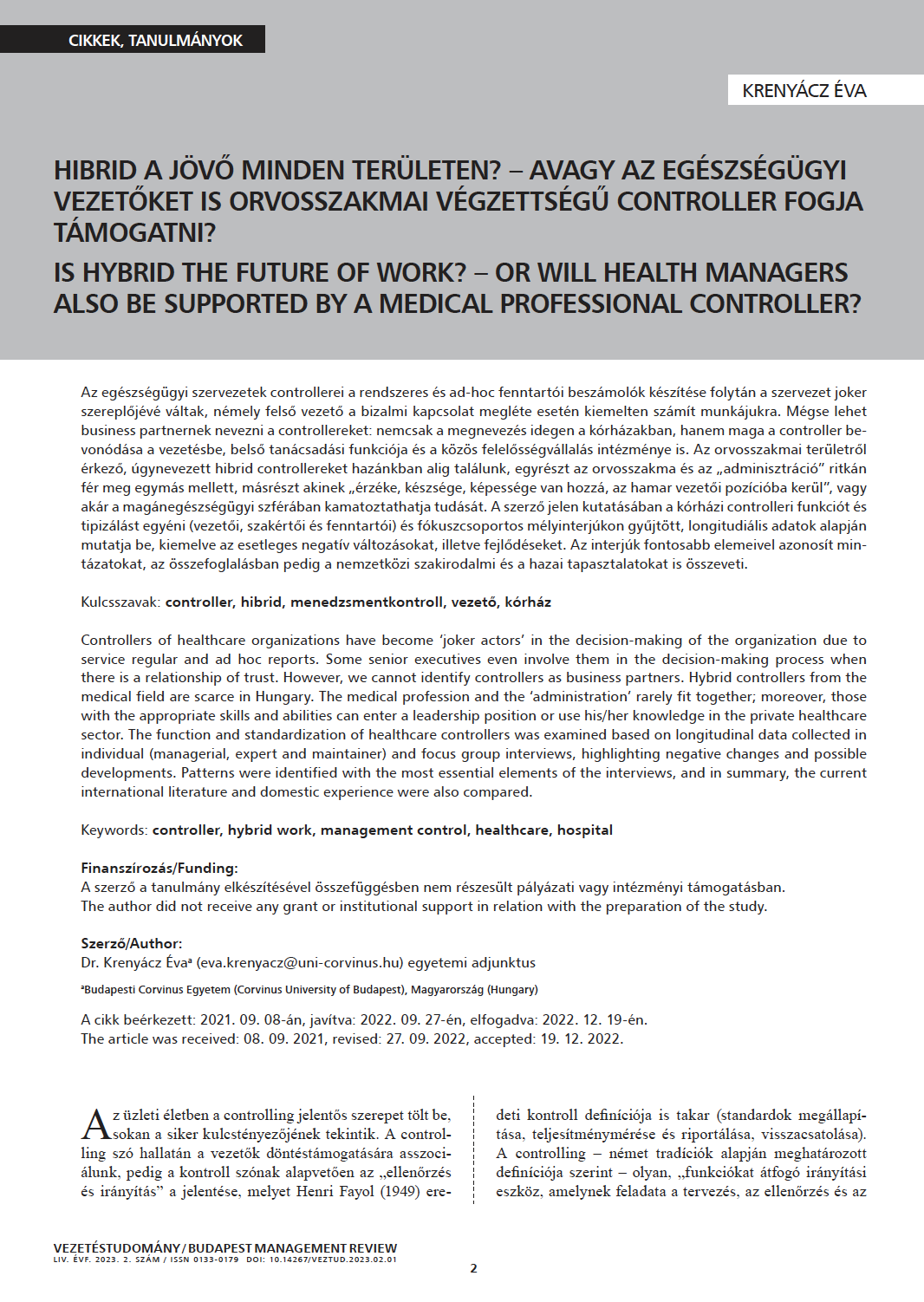Is hybrid the future of work?
Or will health managers also be supported by a medical professional controller?
DOI:
https://doi.org/10.14267/VEZTUD.2023.02.01Keywords:
controller, hybrid work, management control, healthcare, hospitalAbstract
Controllers of healthcare organizations have become ‘joker actors’ in the decision-making of the organization due to service regular and ad hoc reports. Some senior executives even involve them in the decision-making process when there is a relationship of trust. However, we cannot identify controllers as business partners. Hybrid controllers from the medical field are scarce in Hungary. The medical profession and the ‘administration’ rarely fit together; moreover, those with the appropriate skills and abilities can enter a leadership position or use his/her knowledge in the private healthcare sector. The function and standardization of healthcare controllers was examined based on longitudinal data collected in individual (managerial, expert and maintainer) and focus group interviews, highlighting negative changes and possible developments. Patterns were identified with the most essential elements of the interviews, and in summary, the current international literature and domestic experience were also compared.
Downloads
References
Anthony, R. N., & Govindarajan, V. (2009). Menedzsmentkontroll-rendszerek. Budapest: Panem Könyvkiadó.
Anthony, R. N., & Young, D. W. (2003). Management control in non-profit organizations. New York: Irwin.
Baran, W. (2013). Management accounting in the implementation of management control in healthcare organizations. Zeszyty Teoretyczne Rachunkowości, 72(128), 7-31. https://doi.org/10.5604/16414381.1063609
Bodnár, V., Révész, É., & Horváthné Varga Polyák, Cs. (2011). Kontrolling az egészségügyben [E-book]. Budapest: Semmelweis Egyetem.
Bodnár, V. (2004). Mit is ért(s)ünk kontrolling alatt? Interdiszciplináris Magyar Egészségügy, 3(1), 14-18.
Bogt, H. T., van Helden, J., & van der Kolk, B. (2016). New development: Public sector controllership— reinventing the financial specialist as a countervailing power. Public Money & Management, 36(5), 379-384. https://doi.org/10.1080/09540962.2016.1194086
Byrne, S., & Pierce, B. (2007). Towards a more comprehensive understanding of the roles of management accountants. European Accounting Review, 16(3), 469-498. https://doi.org/10.1080/09638180701507114
Bunget, O. C., & Brînduşe, A. I. (2019). Connection Between Controlling Department and Management – Premise for Achieving Organizational Objectives. The Audit Financiar Journal, 17(4), 680-688.
Dózsa, Cs. L. (2010). A kórházak stratégiai válaszai a változó környezetre – Magyarországon a 2000-es években (Doktori értekezés). Budapest: Budapesti Corvinus Egyetem. http://phd.lib.uni-corvinus.hu/550/1/dozsa_csaba.pdf
Fayol, H. (1949). General and industrial administration. New York: Pitman.
Goretzki, L., Strauss, E., & Weber, J. (2013). An institutional perspective on the changes in management accountants’ professional role. Management Accounting Research, 24(1), 41-63. https://doi.org/10.1016/J.MAR.2012.11.002
Henzler, H. (1974). Der Januskopf muss weg! Wirtschaftswoche, 38, 60–63.
Horváth P. (2008). Controlling. Út egy hatékony controllingrendszerhez. Budapest: CompLex Kiadó.
ICV–IGC (Internationaler Controller Verein – Internatinal Group of Controlling) (2012). The Essence of Controlling – The Perspective of the Internationaler Controller Verein (ICV) and the Internatinal Group of Controlling (IGC). Journal of Management Control, 23, 311–317. https://doi.org/10.1007/s00187-013-0168-0
Hyvönen, T., Järvinen, J., Pellinen, J. & Rahko, T. (2009) Institutional Logics, ICT and Stability of Management Accounting, European Accounting Review, 18(2), 241-275. https://doi.org/ 10.1080/09638180802681511
Järvinen, J. (2006). Hybridization and the professional roles of management accountants in the health care sector. A Field Study. In 4 th International Conference on Accounting Auditing and Management in Public Sector Reforms. Siena, Septembre.
Järvinen, J. (2009). Shifting NPM agendas and management accountants’ occupational identities. Accounting, Auditing & Accountability Journal, 22(8), 1187-1210. https://doi.org/10.1108/09513570910999283
Karlsson, B., Hersinger, A., & Kurkkio, M. (2019). Hybrid accountants in the age of the business partner: exploring institutional drivers in a mining company. Journal of Management Control, 30(2), 185-211. https://doi.org/10.1007/s00187-019-00280-1
Körmendi, L., & Tóth, A. (2011). A controlling alapjai. Budapest: Saldo Kiadó.
Krenyácz, É. (2015). A hazai egészségügyi intézmények kontrolling-rendszere. Statisztikai Szemle, 93(8-9), 823-843. https://www.ksh.hu/statszemle_archive/2015/2015_08-09/2015_08-09_823.pdf
Krenyácz, É. (2017). A kórházi kontrolling paradoxona ‒ felemelkedés és/vagy devalválódás? Vezetéstudomány, 48(8-9), 22-34. https://doi.org/10.14267/VEZTUD.2017.09.03
Krenyácz, É. (2018a). Controlling in Hungarian hospitals: History and key issues. Society and Economy, 40(4), 605-622. https://doi.org/10.1556/204.2018.40.4.8
Krenyácz, É. (2018b). Use of management information in hospital decision-making. Vezetéstudomány, 49(5), 2-12. https://doi.org/10.14267/VEZTUD.2018.05.01
Kurunmaki, L. (1999). Professional vs financial capital in the field of health care – struggles for the redistribution of power and control. Accounting, Organizations and Society, 24(2), 95-124. https://doi.org/10.1016/S0361-3682(98)00030-0
Kurunmaki, L. (2004). A hybrid profession: the acquisition of management accounting expertise by medical professionals, Accounting, Organizations and Society, 29(3-4), 327-347. https://doi.org/10.1016/S0361-3682(02)00069-7
Kurunmaki, L., Lapsley, I., & Melia, K. (2003). Accountingization vs legitimation: a comparative study of the use of accounting information in intensive care. Management Accounting Research, 14(2), 112-139. https://doi.org/10.1016/S1044-5005(03)00019-2
Merchant, K. A., & Van der Stede, W. A. (2007). Management control systems: Performance measurement, evaluation and incentives. Harlow: FT/ Prentice Hall.
Musinszki, Z. (2012). Kontrolling alapjai. Miskolc: Miskolci Egyetem.
Pettersen, I. J., & Nyland, K. (2006). Management and control of public hospitals – the use of performance measures in Norwegian hospitals. A case‐study. The International Journal of Health Planning and Management, 21(2), 133-149. https://doi.org/10.1002/hpm.835
Szukits, Á. (2016). Menedzsmentkontroll rendszerek és a controller szervezeti szerepe (Doktori értekezés). Budapest: Budapesti Corvinus Egyetem. https://doi.org/10.14267/phd.2017035
Szukits, Á. (2017). A controlleri szakma hazai középvállalatokban – Mennyiben meghatározó a felsővezető vezetési stílusa? Köz-gazdaság, 12(5), 215-229.
Szukits, Á., & Bodnár, V. (2019). A költségelemzéstől az adathasznosításig–a hazai vállalatok által használt controllingeszközök alakulása az elmúlt ötven évben. Vezetéstudomány, 50(12), 112-121. http://doi.org/10.14267/ VEZTUD.2019.12.10
De Loo, I., Verstegen, B. & Swagerman, D. (2011). Understanding the roles of management accountants. European Business Review, 23(3), 287-313. https://doi.org/10.1108/09555341111130263
Weber, J. (2011). The development of controller tasks: explaining the nature of controllership and its changes. Journal of Management Control, 22(1), 25-46. https://doi.org/10.1007/s00187-011-0123-x
Zünd, A. (1978). Zum Begriff des Controlling – Ein umweltbezogener Erklärungsversuch. In Goetzke, W. – Sieben, G.: Controlling – Integration von Planung und Kontrolle (Vol. 4, pp. 15–26). Köln: GeberaSchriften.

Downloads
Published
How to Cite
Issue
Section
License
Copyright (c) 2023 Vezetéstudomány / Budapest Management Review

This work is licensed under a Creative Commons Attribution 4.0 International License.
Authors assign copyright to Vezetéstudomány / Budapest Management Review. Authors are responsible for permission to reproduce copyright material from other sources.

